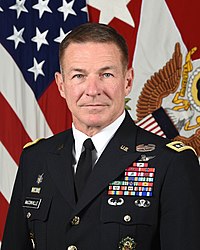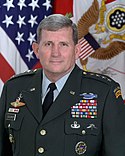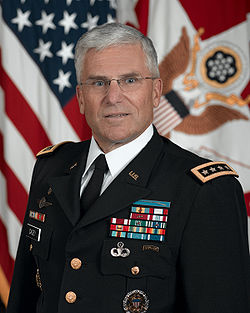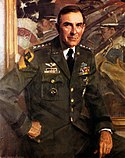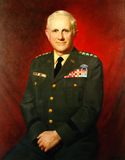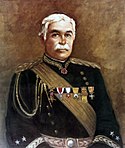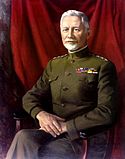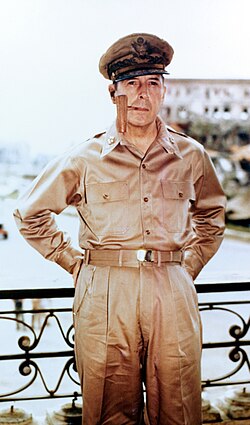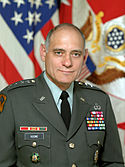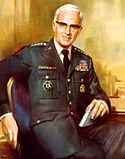USA:s arméstabschef
| USA:s arméstabschef | |
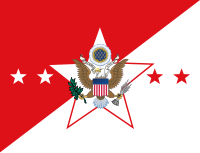 Arméstabschefens befälstecken | |
| Titel | General |
|---|---|
| Säte | Pentagon |
| Utses av | USA:s president med senatens råd och samtycke |
| Underställd | USA:s arméminister |
| Förste innehavare | Samuel B.M. Young |
| Inrättat | 1903 |
| Ställföreträdare | Vice Chief of Staff of the Army |
| Webbplats | www.army.mil/leaders/csa |
USA:s arméstabschef (engelska: Chief of Staff of the Army (CSA) är den högste militäre befattningshavaren inom USA:s armédepartement och är direkt underställd och biträder arméministern (Secretary of the Army) som är den formella chefen för armén och denne är ansvarig inför försvarsministern för arméns beredskap samt dess förmåga att upprätthålla krigsdugliga förband. Arméstabschefen har enligt den lag som fastställer ämbetet graden som 4-stjärning general och utses av presidenten med senatens råd och samtycke.[1]
Arméstabschefen, liksom arméministern, saknar dock operativa befogenheter över arméförbanden. Han är enkelt uttryckt precis som titeln anger stabschef, inte en operativ befälhavare, utan presiderar över arméstaben i Pentagon. Arméstabschefen är också förutom sin roll inom armédepartementet även arméns representant i Joint Chiefs of Staff, det yrkesmilitära organ som ger militärstrategiska råd till nationella säkerhetsrådet, försvarsministern och presidenten. Såvida inte försvarschefen eller vice försvarschefen är arméofficerare är arméstabschefen den yrkesofficer på aktiv stat i armén med högst rang.
För närvarande innehas posten av James C. McConville som är den 40:e i ordningen sedan ämbetet inrättades 1903.
Historik
Före 1903 var titeln på den högsta yrkesmilitären i armén Commanding General of the United States, men ändrades som en del av organisationsreformerna som genomfördes av krigsminister Elihu Root. Innan National Security Act of 1947 skapade dagens försvarsorganisation var krigsministern arméstabschefens chef.
Arméstabschefer från 1903 till nutid
| Nr | Namn | Porträtt | Tillträdde | Avgick |
|---|---|---|---|---|
| 1. | Generallöjtnant Samuel B. M. Young |  | 15 augusti 1903 | 8 januari 1904 |
| 2. | Generallöjtnant Adna Chaffee |  | 19 augusti 1904 | 14 januari 1906 |
| 3. | Generallöjtnant John C. Bates |  | 15 januari 1906 | 13 april 1906 |
| 4. | Ganeralmajor J. Franklin Bell |  | 14 april 1906 | 21 april 1910 |
| 5. | Generalmajor Leonard Wood |  | 22 april 1910 | 21 april 1914 |
| 6. | Generalmajor William Wallace Wotherspoon |  | 22 april 1914 | 16 november 1914 |
| 7. | Generalmajor Hugh L. Scott |  | 17 november 1914 | 22 september 1917 |
| 8. | General Tasker H. Bliss |  | 23 september 1917 | 19 maj 1918 |
| 9. | General Peyton C. March |  | 20 maj 1918 | 30 juni 1921 |
| 10. | General of the Armies John J. Pershing |  | 1 juli 1921 | 13 september 1924 |
| 11. | Generalmajor John L. Hines |  | 14 september 1924 | 20 november 1926 |
| 12. | General Charles Pelot Summerall | 21 november 1926 | 20 november 1930 | |
| 13. | General Douglas MacArthur[2] |  | 21 november 1930 | 1 oktober 1935 |
| 14. | General Malin Craig |  | 2 oktober 1935 | 31 augusti 1939 |
| 15. | General of the Army George C. Marshall |  | 1 september 1939 | 18 november 1945 |
| 16. | General of the Army Dwight D. Eisenhower |  | 19 november 1945 | 6 februari 1948 |
| 17. | General Omar Bradley[3] |  | 7 februari 1948 | 15 augusti 1949 |
| 18. | General J. Lawton Collins |  | 16 augusti 1949 | 14 augusti 1953 |
| 19. | General Matthew B. Ridgway |  | 15 augusti 1953 | 29 juni 1955 |
| 20. | General Maxwell D. Taylor |  | 30 juni 1955 | 30 juni 1959 |
| 21. | General Lyman L. Lemnitzer |  | 1 juli 1959 | 30 september 1960 |
| 22. | General George H. Decker |  | 1 oktober 1960 | 30 september 1962 |
| 23. | General Earle Wheeler |  | 1 oktober 1962 | 2 juli 1964 |
| 24. | General Harold K. Johnson |  | 3 juli 1964 | 2 juli 1968 |
| 25. | General William C. Westmoreland |  | 3 juli 1968 | 30 juni 1972 |
| (T.f.) | General Bruce Palmer, Jr. |  | 1 juli 1972 | 11 oktober 1972 |
| 26. | General Creighton W. Abrams |  | 12 oktober 1972 | 4 september 1974 |
| 27. | General Frederick C. Weyand |  | 3 oktober 1974 | 30 september 1976 |
| 28. | General Bernard W. Rogers |  | 1 oktober 1976 | 21 juni 1979 |
| 29. | General Edward C. Meyer |  | 22 juni 1979 | 21 juni 1983 |
| 30. | General John A. Wickham, Jr. |  | 23 juli 1983 | 23 juni 1987 |
| 31. | General Carl E. Vuono |  | 23 juni 1987 | 21 juni 1991 |
| 32. | General Gordon R. Sullivan[4] |  | 21 juni 1991 | 20 juni 1995 |
| 33. | General Dennis J. Reimer |  | 20 juni 1995 | 21 juni 1999 |
| 34. | General Eric Shinseki |  | 21 juni 1999 | 11 juni 2003 |
| 35. | General Peter J. Schoomaker |  | 1 augusti 2003 | 10 april 2007 |
| 36. | General George W. Casey, Jr. |  | 10 april 2007 | 10 april 2011 |
| 37. | General Martin E. Dempsey |  | 11 april 2011 | 7 september 2011 |
| 38. | General Raymond Odierno |  | 7 september 2011 | 14 augusti 2015 |
| 39. | General Mark A. Milley |  | 14 augusti 2015 | 9 augusti 2019 |
| 40. | General James C. McConville |  | 9 augusti 2019 | sittande |
Se även
Referenser
- Den här artikeln är helt eller delvis baserad på material från engelskspråkiga Wikipedia, Chief of Staff of the United States Army, tidigare version.
Noter
- ^ ”10 U.S. Code § 7033 - Chief of Staff” (på engelska). U.S. Code. Cornell University. https://www.law.cornell.edu/uscode/text/10/7033. Läst 15 januari 2021. ”(a) (1) There is a Chief of Staff of the Army, appointed for a period of four years by the President, by and with the advice and consent of the Senate, from the general officers of the Army. He serves at the pleasure of the President. In time of war or during a national emergency declared by Congress, he may be reappointed for a term of not more than four years. (2) The President may appoint an officer as Chief of Staff only if— (A) the officer has had significant experience in joint duty assignments; and (B) such experience includes at least one full tour of duty in a joint duty assignment (as defined in section 664(f) [1] of this title) as a general officer. (3) The President may waive paragraph (2) in the case of an officer if the President determines such action is necessary in the national interest. (b) The Chief of Staff, while so serving, has the grade of general without vacating his permanent grade. (c) Except as otherwise prescribed by law and subject to section 7013(f) of this title, the Chief of Staff performs his duties under the authority, direction, and control of the Secretary of the Army and is directly responsible to the Secretary. (d) Subject to the authority, direction, and control of the Secretary of the Army, the Chief of Staff shall— (1) preside over the Army Staff; (2) transmit the plans and recommendations of the Army Staff to the Secretary and advise the Secretary with regard to such plans and recommendations; (3) after approval of the plans or recommendations of the Army Staff by the Secretary, act as the agent of the Secretary in carrying them into effect; (4) exercise supervision, consistent with the authority assigned to commanders of unified or specified combatant commands under chapter 6 of this title, over such of the members and organizations of the Army as the Secretary determines; (5) perform the duties prescribed for him by sections 171 and 2547 of this title and other provisions of law; and (6) perform such other military duties, not otherwise assigned by law, as are assigned to him by the President, the Secretary of Defense, or the Secretary of the Army. (e) (1) The Chief of Staff shall also perform the duties prescribed for him as a member of the Joint Chiefs of Staff under section 151 of this title. (2) To the extent that such action does not impair the independence of the Chief of Staff in the performance of his duties as a member of the Joint Chiefs of Staff, the Chief of Staff shall inform the Secretary regarding military advice rendered by members of the Joint Chiefs of Staff on matters affecting the Department of the Army. (3) Subject to the authority, direction, and control of the Secretary of Defense, the Chief of Staff shall keep the Secretary of the Army fully informed of significant military operations affecting the duties and responsibilities of the Secretary.”
- ^ Douglas MacArthur blev utsedd till General of the Army efter sin tid som arméstabschef.
- ^ Omar Bradley blev utsedd till General of the Army efter sin tid som arméstabschef.
- ^ Gordon Sullivan var även under en kortare tid även tillförordnad arméminister under 1993.
Externa länkar
| |||||||||||||||||||||||||
Media som används på denna webbplats
George C. Marshall, General of the Army.
General Peter J. Schoomaker, Chief of Staff, United States Army
John Wickham, former Chief of Staff of the U.S. Army.
General George W. Casey, Jr., 36th Chief of Staff of the United States Army.
General John C. Bates, official portrait by Cedric Baldwin Egeli
- National Portrait Gallery, Smithsonian Institution, Washington, D.C.
Exhibit: "Leonard Wood - Maverick in the Making 1882-1921""
US Army General Matthew Ridgeway as painted by Clarence Lamont MacNelly (1920–1986). The portrait of General Matthew B. Ridgway is reproduced from the Army Art Collection.
Official photo of GEN Raymond T. Odierno, the 38th Chief of Staff of the U.S. Army.
U.S. Army General Creighton W. Abrams, Jr., Chief of Staff of the U.S. Army.
Portrait of General Edward C. Meyer by Everett Raymond Kinstler reproduced from the Army Art Collection.
Portrait
John L. Hines, 11th Chief of Staff of the Army
Harold Keith Johnson, 24th Chief of Staff of the Army; Joseph Richards Essig (1902–1975) was born in Wallingford, Pennsylvania. He pursued his art training at the Pennsylvania Museum School of Industrial Art in Philadelphia, the Metropolitan Museum in New York City, the Pennsylvania Academy of the Fine Arts in Philadelphia, and the British Academy of Arts in Rome, Italy. While in the Army from 1941 to 1945, he took advantage of a period in England to study under Augustus John and then served on the Continent as a draftsman in the 655th Engineer Topographic Battalion attached to the Ninth Army. Later established in Philadelphia, he studied art with Sam Morrow Palmer, Charles H. Woodbury, Leopold Seyffert, and Ceasar Riccardi. His portrait of General Harold K. Johnson, which was painted from life, is reproduced from the Army Art Collection.
Redesigned Joint Staff Badge Reflects Addition of the United States Space Force as a Military Service
William Wallace Wotherspoon, 6th Chief of Staff of the Army.
Thomas W. Orlando (1931-) received a bachelor of arts degree from City College of New York in 1954 and then pursued advanced studies at the Art Students League, the National Academy of Design, the Cape School of Art, and the Brooklyn Museum. During a two-year tour in the United States Navy (1956-1957), he directed a number of art projects for the Office of Public Information. He later joined the faculty of the Pratt-Phoenix Schoolon Manhattan, where he taught advanced drawing and painting until his retirement in 1994. During his career his work was featured in one-man shows at the Berkshire Museum, Newsweek Gallery 10, and a number of private galleries, as well as represented in group shows at the Allied Artists of America, the National Art Club, the Salmagundi Club, the Pratt Institute Gallery, and others. His portrait of Maj. Gen. William W. Wotherspoon was developed from photographs, and is reproduced from the Army Art Center.w:Eric Shinseki Official portrait as Vice Chief of Staff of the Army
General Samuel B. M. Young, official portrait
Frank Ingoglia (1907–1998), designer, illustrator, and portraitist, used his diverse talents in a number of military-related artistic endeavors. His portrait of General Malin Craig is reproduced from the Army Art Collection.
Flag of the Chief of Staff of the United States Army
Gen. Mark A. Milley, Chief of Staff of the Army, poses for a command portrait in the Army portrait studio at the Pentagon in Arlington, VA, August 12, 2015. (U.S. Army photo by Monica King/Released)
U.S. Army General Maxwell D. Taylor, Chairman of the Joint Chiefs of Staff.
General of the Army Douglas MacArthur smoking his corncob pipe, probably at Manila, Philippine Islands, 2 August 1945.
Omar Bradley, by Clarence Lamont MacNelly (1920-1986). Note: MacNelly came to art and portraiture in middle life after successful careers in several other lines of endeavor. A graduate of Rutgers University with a degree in economics, he saw World War II service as a Navy officer and then became a senior executive and creative director of a Madison Avenue advertising agency, as well as a magazine publisher. He was in his forties when he turned to art and the study of portraiture under Austrian-born Frederic Taubes-instructor at Cooper Union School, lecturer at the Art Students League, and author of numerous works on art subjects. Taubes considered MacNelly a born portrait painter. The portrait of General Omar Bradley is reproduced from the Army Art Collection.
Carl Vuono, former Chief of Staff of the U.S. Army.
Adna R. Chaffee, 2nd Chief of Staff of the Army.
Cedric Baldwin Egeli (1936- ) was born in Shady Side, Maryland. He attended Principia College in Illinois before enrolling for two years of study at the Corcoran School of Art in Washington, D.C. A scholarship took him to the Art Students League in New York City for three years of work under Sidney Dickerson, Frank Reilly, and Frank Mason. He was artist-in-residence at the University of Delaware in 1964-1965 before continuing his studies under his accomplished father, Bjorn Egeli, also a contributor to the Chiefs of Staff Portrait Gallery at the Pentagon, Arlington, VA The portrait of Lt. Gen. Adna R. Chaffee was developed from a black and white photograph, and is reproduced from the Army Art Collection.Dennis Reimer, former Chief of Staff of the U.S. Army.
Official portrat of General George Decker
Gordon R. Sullivan, the former Chief of Staff of the U.S. Army, in November 1992.
Official portrait of General Bruce Palmer.
